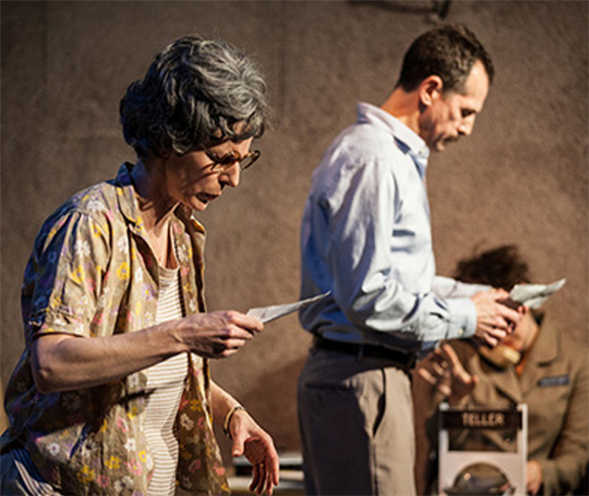Actors are often told to make a character "their own." But what exactly does that mean? And how do actors put themselves into a role when they're playing someone who's almost twice their age?
For the 40-year-old performer Elizabeth Dement, who stars as an 80-year-old retiree in Christina Masciotti's
Social Security, at the Bushwick Starr Feb. 25 - Mar. 14, the first entry point was speech patterns.
Masciotti's play, which is being co-presented by the Bushwick Starr and terraNOVA Collective, follows June Willitz, a retired pretzel factor worker who has recently lost her husband, and the character is based on Masciotti's real-life neighbor in Reading, Pennsylvania. "Christina gave me voice recordings of the woman whom June is based on," says Dement. "It was so intense. She's deaf, she has no teeth, she has a Pennsylvania Dutch accent, and she's 80!"
Any one of the vocal traits would be hard to capture, but all four proved nearly impossible, especially in terms of sustainability for a theatrical environment. Nevertheless, Dement initially found "mimickry was the only way in." Over time, she shifted her character's voice so that it is supported and healthy for performance, but the residual effect of those early imitations remain.
Another huge element for bringing June to life has been exploring her physicality. "That's the part that comes most naturally to me," says Dement, who is a trained dancer and choreographer.
Since June is an octogenarian, Dement describes creating her physicality as "a stripping away of movement." Even though June doesn't leap across the stage, Dement has considered "how her joints would feel, how she sits, what her posture is like, and where her injuries are." Capturing the right physicality is an ongoing process. "Sometimes I catch myself turning my head too quickly," the actress says. "It's not that June doesn't have energy. It's that it doesn't get out of the body in the way I know. There's something about stillness that we don't have, as younger people."
Moreover, because June is deaf, she's always leaning in to hear. "We've created a movement score that exaggerates that leaning in," says Dement. Playwright Masciotti describes this physical score as "formalized movements that lift the scenes out of the very real, gritty world that they are based in." To that end, the goal in <i>Social Security</i> isn't to convince the audience that Dement is actually 80 or to create pure naturalism. "We made no attempt to be literal," Masciotti says. "We tried to add meaning to the text with our choices, rather than restrict out choices to the world of the text."
Social Security director Paul Lazar (of
Big Dance Theater) adds onto Masciotti's idea, pointing to the tradition in Kabuki and Noh theatre, where the Emperor is portrayed by a child so that no one will confuse the performer for the real Emperor. "The farther the actor is from the actual age of the character, the greater the artifice, the more we potentially see about the character," he says, admitting that practicality was also part of the choice in casting a younger performer as June. "But most importantly Lizzie [Dement] loves imitation," Lazar adds. "By 'painting' an old lady rather than being one, she looks and looks so carefully."
In fact, Dement has long wanted to play a character who is much older than herself. "My grandfather, who's 99, has always been a big presence in my life," she says. "Whenever there are family events, I record our conversations as a way of documenting what it's like to be old and to age." Observing her grandfather's aging process, as well as what her mother has gone through in taking care of him, has resonated deeply with Dement in terms of June's emotional life. "I don't think anyone can understand the aging process until it happens to them, but I think it's incredibly lonely," she says. "And the main driving emotion for June is fear, fear, fear. Fear of being alone."
---
Eliza Bent is a playwright and reporter based in BrooklynPhoto by Maria Baranova